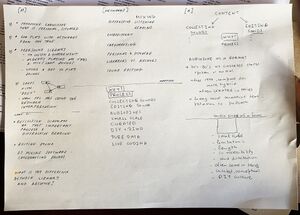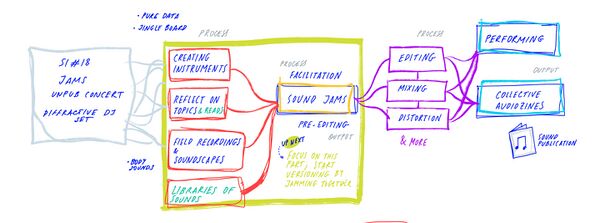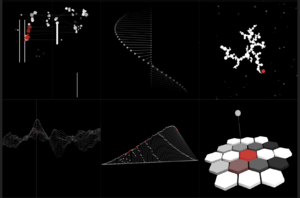Al's XPUB2 proposal draft: Difference between revisions
| Line 208: | Line 208: | ||
====research pads==== | ====research pads==== | ||
▶ [https://pad.xpub.nl/p/alnik-xpub2-research-glossary glossary] <br> | |||
▶ [https://pad.xpub.nl/p/alnik-xpub2-research-audiozines audiozines] <br> | ▶ [https://pad.xpub.nl/p/alnik-xpub2-research-audiozines audiozines] <br> | ||
▶ [https://pad.xpub.nl/p/alnik-xpub2-research-puredata pure data] <br> | ▶ [https://pad.xpub.nl/p/alnik-xpub2-research-puredata pure data] <br> | ||
▶ [https://pad.xpub.nl/p/alnik-xpub2-research-livecoding live coding] <br> | ▶ [https://pad.xpub.nl/p/alnik-xpub2-research-livecoding live coding] <br> | ||
Revision as of 10:44, 19 October 2022
// back to Ål's main page
// back to Graduate Seminar
Questions
- What do you want to make?
- How do you plan to make it?
- What is your timetable? [stages] [deadlines]
- Why do you want to make it?
- Who can help you and how?
- Relation to previous practice
- Relation to a larger context
- References/bibliography
- Who is the work for (part of why do you want to make it)
What do you want to make?
[collaborative research] this project is being done [partially] in collaboration with mits🤖. Together, we aim at researching and working on sound publication as a format for our project/s and on collective creation (jams) as a method.
=======================================
13-10-2022
What is the exact focus of the project?
With my current research, I am exploring ways to create audiozines in a collective way. From my professional experience as a facilitator and editor, I find it much more interesting to bring some constrain while creating time and space for people to co-create. Having freedom within a predefined structure and frame. Thus, the format of audiozines in a particular restrain of length and concept [topic/practice etc.] is a method I am interested in researching and trying out with groups of people with or/and without musical training.
As a final output of the project, I would like to make series of sound publications in the format of audiozines. I am interested in exploring the connection between fanzines and audiozines as an independent, radical, liberating, self-publishing practice that can be created with others - embracing the DYI and DIWO culture. Audiozines are small format sound publications that are based on a particular concept, they are curated and mixed, unlikely today's format of podcasts and radio shows.
_01 [exploring and communicating a method of producing sound based publication collectively]
with the method in focus, the project is about researching the methods, trying different ways to facilitate jams and collecting them in a final publication. The form of the publication is not a focus, but a result/output of the research. Since this is a really big project that can be developed in a longer time frame, it might make sense that this starts now and continues after graduation.
or
_02 [publishing and performing audiozines]
with the form of the publication in focus, I put constrain in the final outcome and the way the content is being created is not that important. We are creating a library of sounds that will be published and performed as a final project. As a "smaller-scale" project focus, this might make more sense to focus at this point for the master proposal.
=======================================
29-09-2022
=======================================
[for the final graduation moment] i would like to make a sound performance and/or sound installation using the audiozines, created during our research during the whole year [could make a rhythm of making one zine per month, e.g.]. Those zines would be also documented in printed zine versions [the two formats can also go together - transmedia storytelling - like some part of the content is only on the printed zine; some - on the audio].
I am struggling with finding my research question.
Why do you want to make it?
Accessibility to people without musical training to jam and create sound pieces (as per the improvisation methods of Pauline Oliveros).
I am excited about doing the jams together with Mitsa and others, because I have always felt jamming sessions quite closed and inaccessible for people without musical training. As an amateur in music and an absolute music-lover, I have always dreamt to take part in jams, but I couldn't find people nor access to any jams. After the Music Moves You[th] residency in France in September 2022; but also after attending Tisa's home jams and Resister at WORM during 2022, I felt liberated to take part and even facilitate/host my own jams, which is something I want to do collectively (with Mitsa for our master research). An important element in this research and practice, for me, is the raw and pure, self-made aesthetics of the audiozine format.
to add:
-enjoy the artistic and academic research (make it joyful rather than suffer it - background of Bulgarian educational system)
-pleasure in work is liberating (referring to Bulgarian saying: "too much of good is not a good sign", meaning if you are happy, then something bad should happen soon)
-i realised a lot of my practice is responding - listening, seeing, being triggered by concepts, ideas, events... and responding to them one way or another
-my motivation is often a trigger that comes from others
...
How do you plan to make it?
I would like to try out the following:
_1 - collect and map methods to collect sound; also ways to edit it and looking for the reasons behind both choices of method;
_2 - starting doing small experiments with different ways to create sound (computer-base and analog, by jams, by field recording) - I feel like I need to try some of them out first (explain what is electronic and what analog);
_3 - creating small experiments with a particular ask/question/intention behind - in search of the research topic maybe?
_4 - recording sound, mixing it due to some concept and then creating small zines to see how it's going to look like
_5 - idea to create an instrument (maybe facilitating sessions when others play with this instrument with an assignment to create something specific)
_6 - idea of using Room for sound - invite residents to participate - diffractive mixing of their contributions
What is your timetable?
october
ways to collect and edit sound + ways to facilitate jams
1_ reflect on the mixing we did - to unpack what we did // with Mitsa 2_ schedule jams and collecting sounds moments // with Mitsa 3_ filed recording experiments // 10-14 oct 4_ public moment in leszaal // 17 oct 5_ learn to make pads and harmony // with Mitsa
outcomes:
_documentation and raw-raw draft of proposal _field recordings _sounds created _experiments with edited sound _pure data experiments _facilitated jam(s) experiments
november
ways to collect and edit sound + ways to facilitate jams + proposal draft
1_ get inspiration // 2 nov Bon Iver live // 25 nov Arooj Aftab, Lucrecia Dalt live 2_ prototype of audiozine + print zine - test the combo - put all experiments together 3_ edit music and sound + document methods 4_ explore topics: what makes all the experiments so far come together? 5_ thesis outline - what form will it take (a report of the research and practice?)
outcomes:
_proposal ready // 18 nov _thesis outline (form) // 18 nov _prototype of audiozine _topics drafting start
december
_finding focus - what would be the focus of the project? _assessment _assessment reflection and re-design the plan
outcomes:
_assessment and feedback // 12-13 dec
Who can help you and how?
[space] would like to try out different spaces and locations in rotterdam; also inviting different people and orchestrating jams with various publics [when that is possible]
- make a list with spaces that we are interested in making jams in;
- what are the characteristics of these places and how to use them in relation to our jam?
[publics] define different publics and test with them; who is also doing something similar in the area?
[xpub]
- check with tutors: places in Rotterdam where we can make jams + do we have budget to rent rooms & equipment; read & works recommendations on audiozines and sound publications
- Leslie - using her studio for jams (yes!) and checking some other spaces we can use
Relation to previous practice
My complicated relation to music and sound started in my early years of childhood when I was attracted to music but discouraged by my parents to pursue any musical training. However, listening to music was always a big part of my life and in 2012 I started my side-project "Lazy Indie Sundays" - monthly curated playlist with indie music. Then, I started performing in Sofia by DJ mixing this kind of music in conceptual events (listening to indie music in bars and clubs in Bulgaria is rather an underground and subcultural thing and not popular at all). After turning 30, I decided to try to learn playing a musical instrument and took acoustic guitar lessons in 2015. I was travelling for work too often, which made this process difficult and inconsistent. Thus, I started a music production 6-month course in 2018 which I couldn't finish because I had to travel. Just finally started to focus on my artistic practice development for the first time at that moment, I had to choose a focus between learning music or working more in illustration and visual translation. I decided to develop my visual practice.
In 2019 I designed an Erasmus+ project which aimed at researching how music can be made accessible for people without musical training and how it can be used in educational activities. Because of COVID-19 outbreak, the project couldn't take place earlier than September 2022. The Music Moves You[th] residency was completely liberating for me and made me realise that I can still pursue my passion in music and sound. What was a really strong backbone to this liberation, were the events part of my studies at XPUB in Spring 2022: Radio Implicancies publication, visiting Resister at WORM, taking part in a jam session organised by Tisa (XPUB alimni), and all the jams we did with my XPUBies during the first year at the master programme.
[wip] list of previous projects, related to this one - to draw from:
2022-09 - Music Moves You[th] residency about experimenting with tools to make music accessible in educational activities [what i did: project design; facilitation; contribution]; facilitated and participated in creating a sound publication on Nomadwaves
2022-06 - Diffractive live DJ mix at XPUB grad show (with Mitsa & Supi) - live dj set with the contributions created during the special issue 18: Radio Implicancies
2022-06-22 - participation in X-unPublic concert facilitated by Harrold Schellinx
2022-04/06 - a few mini projects for special issue 18: care-taking of release 5 Nested Narratives [facilitation; editing; contribution]; contributions for other releases - "voices of hierarchy"; prototyping exercise "[[Special Issue 18 Work#01. How Does Anxiety Sound Like / individual work [prototyping]|how does anxiety sound like]]" and "reversed words".
2018 - curated and coordinated a festival in France which was based on collective co-creation and co-facilitation: Créestival
2018 - took a 5-month course in music production. During the training i created and published 3 pieces: indulge, a heartbreak & autobahn.
2012+ - curated and published playlists with indie music on Mixcloud
Relation to a larger context
ideas to explore:
-accessibility - everyone is welcome and collective creation is possible
-pleasure and enjoyable activity while also doing work (deep listening, paying attention, group bonding and exploring various topics)
-sound in artistic research
-sound publications and audiozines importance?
References/bibliography
WIP - what informs the research
reads
Oliveros, P., 2005. Deep Listening. New York. Deep Listening Publications. [annotated pad]
adrienne maree brown, 2019. Pleasure Activism. The Politics of Feeling Good. Chico, Edinburgh. AK Press. [annotated pad]
Evens, A., 2005. Sound Ideas: Music, Machines & Experience. U of Minnesota Press [annotated pad]
Kreidler, J. 2013. loadbang. Programming Electronic Music in Pure Data. 2nd edition. Hofheim: Wolke Verlag.
Weiss, A., 2001. Experimental Sound & Radio. The MIT Press.
Groot, M. 2019. The Amateur's Armour. [online] Available at: <https://underbelly.nu/wp-content/uploads/2015/04/The-Amateurs-Armour.pdf> [Accessed 11 October 2022].
sound publications
Brown, A. R., 2022. Beneath Maiwar.[online] Available at: <https://www.explodingart.com/arb/2022/06/28/beneath-maiwar/> [Accessed 30 September 2022]. [annotated pad]
Nagy, A., 2018. Hackpact / Sonification Studies. [online] Available at: <https://stc.github.io/HackPact/> [Accessed 30 September 2022]. [annotated pad]
Who is the work for?
[methods to facilitate collective sound publication creation]
_educators: people who are facilitating various educational activities and are looking for ways to bring more mixed media in their activities;
artists: who are looking for new techniques for their practice and ways to experiment, boost their creative process; to find more ways to reflect over topics and contents;
_tba: who else? tba
[publish and perform audiozines]
artists: who are looking for new techniques for their practice and ways to experiment, boost their creative process; to find more ways to reflect over topics and contents;
topic-related interest: if the audiozines reflect on a particular topic, could be interesting for people who are triggered by the topic?
tba: who else? tba
Research places
wiki
▶ Al Nik's Hackpact
▶ Sound jams research
wip
▶ the first draft pad [created during the Graduate Seminar on 29-09-2022]
▶ jams ideas
▶ references - collective pad with Mitsa
research pads
▶ glossary
▶ audiozines
▶ pure data
▶ live coding



